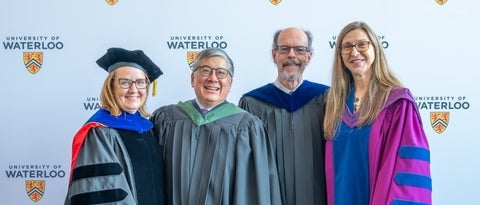







Welcome to the Department of Psychology
The Department of Psychology at UWaterloo offers several programs at the undergraduate and graduate level.
Undergraduate Major Programs
The University of Waterloo offers two undergraduate degrees in Psychology: Bachelor of Arts and Bachelor of Science in Psychology.
For information about our BSc Psychology program, please check the Faculty of Science website.
Students enrolled in the Faculty of Arts can major in Psychology through one of the following programs:
- BA Honours Psychology (regular or co-op)
- BA Honours Arts and Business, Psychology (regular or co-op)
- BA Four-Year General Psychology (regular only)
- BA Three-Year General Psychology (regular only)
It is also possible to graduate with a double major in Psychology and another discipline.
Click here for more information about our degree options and specializations at the undergraduate level.
Undergraduate Minors and Diploma
Psychology Minor
Along with the wonderful major program options, the psychology department also has a Psychology Minor consisting of eight courses. This Minor gives students a chance to experience a variety of psychology disciplines.
Human Resources Management Program
The Human Resources Management (HRM) program here in the Department of Psychology is made up of two possible academic plans: a Minor for undergraduates and a Diploma for post-degree students. We are excited to be able to provide students with the opportunity to learn from working professionals in various areas of the HR world while also being able to complete the course requirements needed for the Certified Human Resources Professional (CHRP) designation or the Certified Human Resources Leader (CHRL) designation offered by the Human Resources Professionals Association (HRPA).
Cognitive Science Minor
Another great Minor to consider is the Cognitive Science Minor. Cognitive Science courses include courses from a variety of disciplines and faculties, including Computer Science, English ECE, Biology, Psychology, Philosophy, and more!
Psychology Graduate Programs
The Department of Psychology offers three types of programs at the graduate level.
Master of Arts in Psychology
The University of Waterloo offers a full-time, two year Master of Arts in Psychology program that can be completed in the following research areas. Please visit the area webpage to find more information on the area of study.
Master of Applied Science in Psychology
The University of Waterloo offers two Master of Applied Science level programs.
The Master of Applied Science (MASc) program in Developmental and Communication Science (DCS) is a full-time, one-year program offered within the Developmental Area of the Department of Psychology.
The Master of Applied Science (MASc) in Industrial-Organizational Psychology is a full-time, two-year program offered within the Industrial-Organizational Area of the Department of Psychology.
PhD in Psychology
The University of Waterloo offers a PhD in Psychology that can be completed in the following research areas. Please visit the area webpage to find more information on the area of study.
Our faculty are internationally renowned and our graduate and undergraduate programs are consistently ranked among the top departments in Canada. Our department conducts high-impact research in each of the six major subdivisions of psychology listed below.
Resources
News
Register now for clinical psychology workshop on social anxiety (open to all)
Is this Common? Differentiating Shyness from Social Anxiety
Clinical psychology graduate students Van Bui, Sophie Kudryk, and Alexa Nordine will present a workshop for the general public titled, Is this Common? Differentiating Shyness from Social Anxiety on Tuesday, November 26, 2024, from 7:00 pm to 8:30 pm. The workshop will take place in the Central Library, Meeting Room C, 85 Queens Street North, Kitchener. Registration is required. There is no cost to attend and registration has just opened.
Social anxiety reflects a common mental health concern associated with intense anxiety and a fear of judgement from others that is experienced before, during, and after social events. Clinical psychology graduate students from the University of Waterloo will discuss how social anxiety may present and how to differentiate it from shyness and normative social concerns. This program will provide listeners with an understanding of social anxiety and its impact on individuals. Tips and strategies for feeling comfortable in social situations will also be shared.
Please come out and support your colleagues.
Dr. Geoffrey T. Fong inducted into the Canadian Medical Hall of Fame
Congratulations to Dr. Geoffrey T. Fong on being named one of the 2025 inductees to the Canadian Medical Hall of Fame.
Dr. Myra Fernandes Selected as 2026 Governing Board Chair of the Psychonomic Society
Congratulations to Dr. Myra Fernandes who has been selected as the incoming Governing Board Chair of the Psychonomic Society! The Psychonomic Society is the preeminent international society for the experimental study of cognition and has over 4,300 scientist members.
Events
Megan Kelly's PhD Oral Defence
Megan Kelly's thesis is entitled: "On the effects of external support on memory and metamemory".
All are welcome to attend.
Amy Minnikin's PhD Oral Defence
Amy Minnikin's thesis is entitled: "Two Essays on Managers' Feedback Behavior in the Workplace".
All are welcome to attend.
Is this Common? Differentiating Shyness from Social Anxiety
Clinical psychology graduate students Van Bui, Sophie Kudryk, and Alexa Nordine will present a workshop for the general public titled, Is this Common? Differentiating Shyness from Social Anxiety on Tuesday, November 26, 2024, from 7:00 pm to 8:30 pm. The workshop will take place in the Central Library, Meeting Room C, 85 Queens Street North, Kitchener. Registration is required. There is no cost to attend and registration has just opened.
Social anxiety reflects a common mental health concern associated with intense anxiety and a fear of judgement from others that is experienced before, during, and after social events. Clinical psychology graduate students from the University of Waterloo will discuss how social anxiety may present and how to differentiate it from shyness and normative social concerns. This program will provide listeners with an understanding of social anxiety and its impact on individuals. Tips and strategies for feeling comfortable in social situations will also be shared.
Please come out and support your colleagues.

